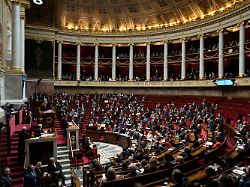constitutional complaint and strike
Pension reform decided – government survives votes of no confidence
03/20/2023, 7:34 p.m
Because the majority is shaky, the French government is pushing through the controversial pension reform in the country without a vote in a special article. The opposition is fuming and wants to prevent the raising of the entry age by means of a vote of no confidence. she fails
France’s massively controversial pension reform has cleared the final hurdles. The government survived two votes of no confidence in the National Assembly. In both cases, the necessary absolute majority of 287 votes was not achieved. In the first vote, 278 MPs withdrew their confidence in the center government under President Emmanuel Macron, as Parliament President Yaël Braun-Pivet announced. But this was not enough – nine votes were missing in the cross-party motion. A second motion of no confidence brought by the right-wing populist Rassemblement National also failed – only 94 MPs voted for it.
The pension reform, which envisages raising the retirement age from 62 to 64, has thus finally been passed. A fall of the government would also have meant the end of the reform that Prime Minister Elisabeth Borne pushed through while bypassing parliament
“The government no longer has any legitimacy, the prime minister must resign,” said the leader of the left-wing populists, Mathilde Panot. The 34-year-old announced that she would file a constitutional complaint against the law tomorrow, Tuesday. Protests against the reform would continue, she said. “The country is in a deep political crisis.”
“The French felt slapped by using the 49.3,” said right-wing populist parliamentary group leader Marine Le Pen. “The president should listen to what this result means politically,” she added.
“A Difficult Moment”
The governing group’s spokeswoman, Violette Spillebout, admitted the close result was “a difficult moment”. “We will have to talk within the parliamentary group and the government majority about how things will proceed in the National Assembly,” she said.
Last week, after weeks of heated debates, the two chambers of parliament were supposed to finally vote on the reform. The Senate approved the project. However, a green light from the National Assembly, where the government does not have an absolute majority, seemed uncertain. The government therefore decided at the last minute to push the reform through a special article of the constitution – 49.3 – without a vote by the National Assembly. The opposition then submitted two motions of no confidence.
Currently, the retirement age in France is 62 years. In fact, retirement begins later on average: those who have not paid in long enough to receive a full pension work longer. At the age of 67 there is then a pension without a deduction, regardless of the payment period – the government wants to keep this, even if the number of payment years required for a full pension is to increase more quickly. She wants to increase the monthly minimum pension to around 1,200 euros. With the reform, the government wants to close an impending gap in the pension fund.
Protests will continue – strikes planned
The summary procedure enforced by the government had further fueled angry protests against the reform. On Monday, demonstrators temporarily blocked traffic at Rennes and other places. The strike in the refineries and in the garbage collection continues. On Tuesday and Wednesday, a fifth of the flights at Paris-Orly and Marseille-Provence airports are to be canceled again. Rail traffic is also further affected. Another day of protests with strikes and demonstrations is planned for Thursday.
French President Emmanuel Macron stressed at the weekend that the reform was “pursuing its parliamentary path”. He emphasized that the reform had already been debated in Parliament for 170 hours and that the conciliation committee had worked out a compromise text.
